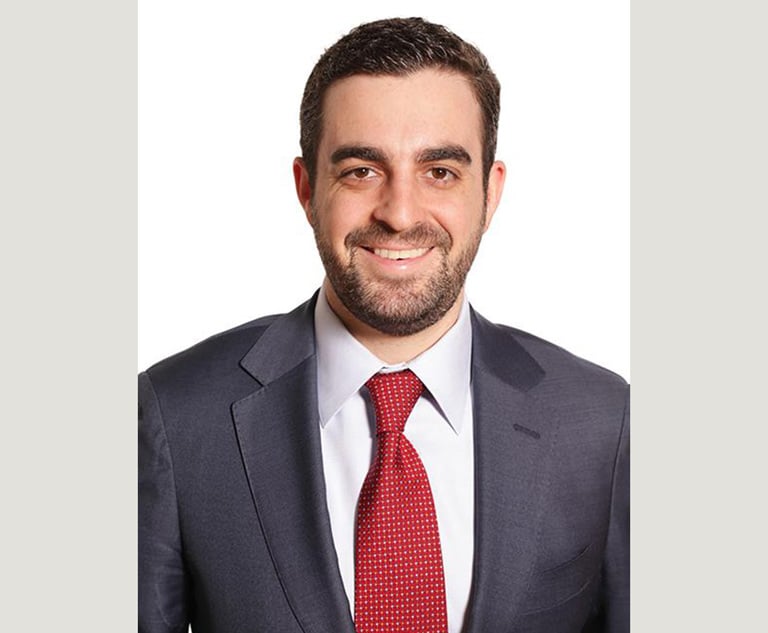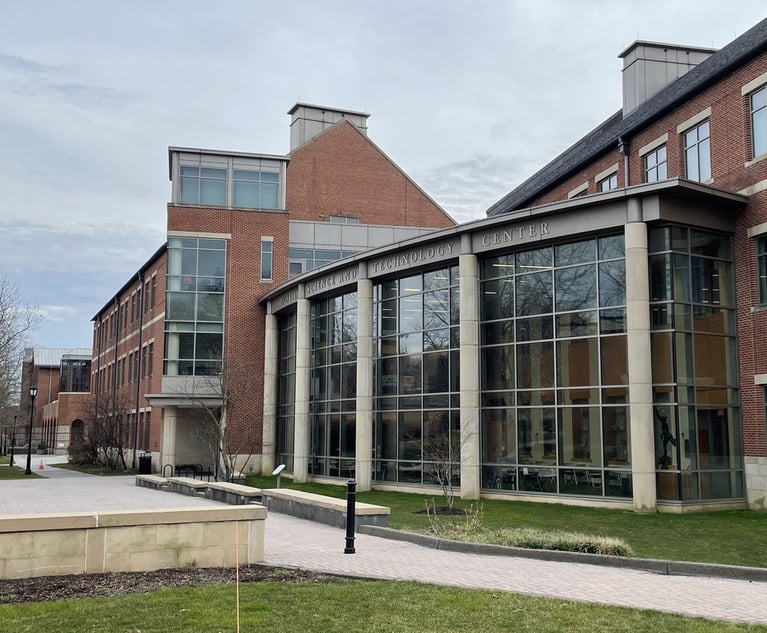 Superior Court of Pennsylvania, 601 Commonwealth Ave #1600, Harrisburg. Photo: Google
Superior Court of Pennsylvania, 601 Commonwealth Ave #1600, Harrisburg. Photo: GoogleTwo Pa. Appellate Court Judges Transferred to Help Handle Caseload
Senior Judges Dan Pellegrini, 73, and James Gardner Colins, 72, were both transferred from the Commonwealth Court to the Superior Court beginning Jan. 1.
January 16, 2019 at 04:55 PM
4 minute read
At the start of the year, two longtime Commonwealth Court judges were transferred over to the Pennsylvania Superior Court to help the fellow intermediate appellate court handle its busy caseload.
Senior Judges Dan Pellegrini, 73, and James Gardner Colins, 72, were both transferred from the Commonwealth Court to the Superior Court beginning Jan. 1.
The transfers bring the busy Superior Court's bench to a total of 20 judges, with 14 commissioned judges and six senior judges. The Commonwealth Court is now half the size, with nine commissioned judges and one senior judge.
According to documents obtained by The Legal, then-President Judge Susan Peikes Gantman made the request for additional senior judges in September, and Chief Justice Thomas Saylor approved the request soon after. Gantman, whose terms as the court's president judge ended last year, had cited “caseload” as the reason for the request. The documents indicate the two are set to sit as senior judges on the Superior Court at least until June 30.
“Resources are allocated within the court where they are most needed,” Stacey Witalec, spokeswoman for the Administrative Office of Pennsylvania Courts, said about the transfers.
Caseload statistics from the AOPC give a clearer picture of that need.
According to the 2017 numbers, which are the most recently available, the Superior Court concluded 8,060 cases during the year, and 8,019 new appeals were filed with the court. That number is up slightly from the 7,965 filed and 7,884 concluded during 2016, but, according to the numbers, the caseload has hovered between nearly 7,600 and slightly more than 8,100 over the past seven years.
The Commonwealth Court has seen slightly less than half the caseload as the Superior Court, court statistics say.
According to the numbers, in 2017 the Commonwealth Court saw 3,661 new cases filed, and it disposed of 3,158 cases. Caseloads for the Commonwealth Court varied between about 3,800 and 4,000 each year, with 2017 giving the court its lowest caseload since 2011, according to court statistics.
The Superior Court also saw significant changes over the past year, with four new judges joining the court beginning in 2018 and Senior Judges James J. Fitzgerald III and William Platt stepping down from the bench.
Despite the different legal areas that the two courts deal with, practitioners said they don't have any concerns about the transfers of Pellegrini and Colins.
“What's nice about these two particular senior judges is that they're both very experienced appellate court judges and they're both very familiar with Pennsylvania law, of course,” appellate attorney Howard J. Bashman said. “I think being on the Superior Court versus the Commonwealth Court is not going to present any huge difficulties for these two, even though in various ways the caseload will be different.”
The Commonwealth Court handles litigation dealing with government agencies, and the Superior Court handles nearly everything else, with a significant portion of its caseload stemming from criminal cases. The Commonwealth Court also handles the bulk of the election law challenges throughout the state.
Election law attorney Adam Bonin said both Pellegrini and Colins were experts in handling election cases, and so years of experience handling these matters will leave with them.
“You always knew when a case was assigned to one of them that it was going to be professionally handled and resolved on the facts and the law,” he said. “Because of the experience that both of them have on election law—and they had an understanding of what they were seeing and understood the political context—even when you lost before them, you always knew you got a fair hearing.”
Regardless of the losses of Colins and Pellegrini, he said he is still very confident in the Commonwealth Court when it comes to election law.
When it comes to the Superior Court's gains, Bashman said practitioners should be prepared.
“These are two smart and thoughtful judges, and I think people that come before them at oral argument will need to be prepared to answer any tough questions the case presents,” Bashman said.
This content has been archived. It is available through our partners, LexisNexis® and Bloomberg Law.
To view this content, please continue to their sites.
Not a Lexis Subscriber?
Subscribe Now
Not a Bloomberg Law Subscriber?
Subscribe Now
NOT FOR REPRINT
© 2024 ALM Global, LLC, All Rights Reserved. Request academic re-use from www.copyright.com. All other uses, submit a request to [email protected]. For more information visit Asset & Logo Licensing.
You Might Like
View All
Phila. Jury Hits Sig Sauer With $11M Verdict Over Alleged Gun Defect
3 minute read

Judge Approves $1.15M Settlement, Reduces Attorney Award in COVID-19 Tuition Reimbursement Suit
4 minute read
Dechert 'Spark Tank' Competition Encourages Firmwide Innovation Focus
Trending Stories
- 1Simpson Thacher Replenishes London Ranks With Latest Linklaters Defection
- 2Holland & Knight, Akin, Crowell, Barnes and Day Pitney Add to DC Practices
- 3Squire Patton Boggs Associate Among Those Killed in String of Methanol Poisonings
- 4Womans Suit Alleging Negligence to Sex Trafficking by Hotel Tossed by Federal Judge
- 5More Big Law Firms Rush to Match Associate Bonuses, While Some Offer Potential for Even More
Who Got The Work
Michael G. Bongiorno, Andrew Scott Dulberg and Elizabeth E. Driscoll from Wilmer Cutler Pickering Hale and Dorr have stepped in to represent Symbotic Inc., an A.I.-enabled technology platform that focuses on increasing supply chain efficiency, and other defendants in a pending shareholder derivative lawsuit. The case, filed Oct. 2 in Massachusetts District Court by the Brown Law Firm on behalf of Stephen Austen, accuses certain officers and directors of misleading investors in regard to Symbotic's potential for margin growth by failing to disclose that the company was not equipped to timely deploy its systems or manage expenses through project delays. The case, assigned to U.S. District Judge Nathaniel M. Gorton, is 1:24-cv-12522, Austen v. Cohen et al.
Who Got The Work
Edmund Polubinski and Marie Killmond of Davis Polk & Wardwell have entered appearances for data platform software development company MongoDB and other defendants in a pending shareholder derivative lawsuit. The action, filed Oct. 7 in New York Southern District Court by the Brown Law Firm, accuses the company's directors and/or officers of falsely expressing confidence in the company’s restructuring of its sales incentive plan and downplaying the severity of decreases in its upfront commitments. The case is 1:24-cv-07594, Roy v. Ittycheria et al.
Who Got The Work
Amy O. Bruchs and Kurt F. Ellison of Michael Best & Friedrich have entered appearances for Epic Systems Corp. in a pending employment discrimination lawsuit. The suit was filed Sept. 7 in Wisconsin Western District Court by Levine Eisberner LLC and Siri & Glimstad on behalf of a project manager who claims that he was wrongfully terminated after applying for a religious exemption to the defendant's COVID-19 vaccine mandate. The case, assigned to U.S. Magistrate Judge Anita Marie Boor, is 3:24-cv-00630, Secker, Nathan v. Epic Systems Corporation.
Who Got The Work
David X. Sullivan, Thomas J. Finn and Gregory A. Hall from McCarter & English have entered appearances for Sunrun Installation Services in a pending civil rights lawsuit. The complaint was filed Sept. 4 in Connecticut District Court by attorney Robert M. Berke on behalf of former employee George Edward Steins, who was arrested and charged with employing an unregistered home improvement salesperson. The complaint alleges that had Sunrun informed the Connecticut Department of Consumer Protection that the plaintiff's employment had ended in 2017 and that he no longer held Sunrun's home improvement contractor license, he would not have been hit with charges, which were dismissed in May 2024. The case, assigned to U.S. District Judge Jeffrey A. Meyer, is 3:24-cv-01423, Steins v. Sunrun, Inc. et al.
Who Got The Work
Greenberg Traurig shareholder Joshua L. Raskin has entered an appearance for boohoo.com UK Ltd. in a pending patent infringement lawsuit. The suit, filed Sept. 3 in Texas Eastern District Court by Rozier Hardt McDonough on behalf of Alto Dynamics, asserts five patents related to an online shopping platform. The case, assigned to U.S. District Judge Rodney Gilstrap, is 2:24-cv-00719, Alto Dynamics, LLC v. boohoo.com UK Limited.
Featured Firms
Law Offices of Gary Martin Hays & Associates, P.C.
(470) 294-1674
Law Offices of Mark E. Salomone
(857) 444-6468
Smith & Hassler
(713) 739-1250





